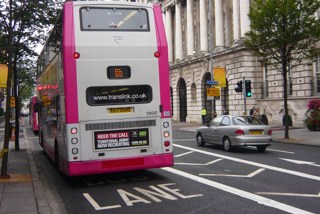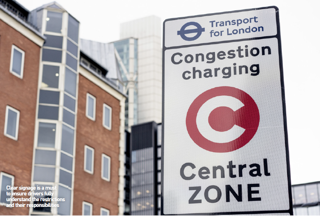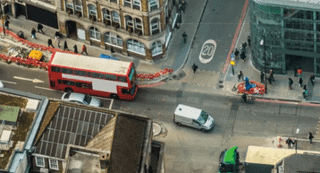MPs are being urged by the AA to scrutinise the Government’s proposals to give councils the powers to enforce yellow box, prohibited turn and other moving traffic offences.
Legislation, to give local authorities the powers to fine drivers across England and Wales, is beginning its journey through Parliament, with the new rules set to take effect from June 1.
Councils wanting to undertake civil enforcement of moving traffic contraventions, including prescribed traffic signs for use at school street schemes, will need to apply to the Secretary of State for an order to be made designating the council as the enforcement authority in their area.
Subject to Parliamentary approval of the regulations, the Government says it plans to publish statutory guidance in late March 2022.
However, the AA says that London’s track record for enforcing these offences indicates the need for MPs to scrutinise the Government’s proposals and reinforce driver protection.
Key to that is the need for a process to identify fines hotspots and to force councils to suspend enforcement until the causes of hotspots are identified and rectified.
Alternatively or additionally, as set out in the Government’s ‘Gear Change’ and other documents, drivers should get a first-time warning letter, argues the AA.
For example, London traffic penalty adjudicators continue to highlight instances of bad road layout, or councils ignoring or simply not understanding the rules of enforcement.
With most innocent drivers paying up instead of contesting unjustified Penalty Charge Notices (PCNs), the AA says that councils can haul in tens of thousands of pounds in fines at locations they know to be traps.
It highlights a 12-metre bus lane in Harrow that caught 7,854 drivers between April 2019 and the end of 2021.
Harrow Council was told by a London Tribunal traffic adjudicator in January 2021 that signage was ‘insufficient’ yet drivers were still being fined in August.
An AA survey of 13,449 drivers in December found that in the past year, 7% received a bus lane fine. In London, it was 11%
For stopping in a yellow box junction, 2% received a fine. In London, it was 12%.
Entering a zone where car access is limited or banned, 3% received a fine, In London, it was 15%.
Less than half of those receiving fines accept that they were guilty but more than a quarter paid the early and discounted fine, either because risking the full fine would have landed them in financial trouble or because it was the easiest thing to do.
Among younger drivers, the threat of financial hardship pressured up to 24% of them to pay early.
For those complaining to councils that a fine was unfair, their chance of getting it cancelled was approximately one in three across the UK and one in four in London.
For those who appealed to a traffic tribunal, their chance of success was 50:50.
Edmund King, the AA’s president, said: “Bus lane fines across the UK have been a source of driver anger and dismay for years, particularly when the same locations churn out thousands of Penalty Charge Notices (PCNs) each year without improving signage or layout.
“Thousands of fines are a clear indication that not only has the signage and layout of restrictions at those locations been inadequate, often stressed at appeal, but that councils have done little or nothing about it and have been happy just to let the cash keep rolling in.”
He continued: “AA research shows that drivers who know they have done nothing wrong baulk at the obstacles put in the way of proving their innocence – the principal one being the fear of having to pay a full fine.
“Meanwhile, appeals reveal regular flaws in enforcement that are too often ignored by council enforcers. Why? Because the councils know the majority of drivers will pay up anyway and stuff town hall coffers with easy money.”
King claims that the experience of London with enforcement of moving traffic violations sends a clear message to MPs.
“The roll-out beyond the capital needs effective checks and balances,” he said. “That includes identifying, analysing and rectifying the causes of fines hotspots.
“And, where a traffic tribunal adjudicator identifies a problem that is not just a one-off, the council should suspend enforcement and report back to the adjudicator on how it has been resolved.
“Alternatively, or better still additionally, first-time offenders should be sent a warning letter, as set out by the Government previously.
“After all, the object of enforcement is to get road users to understand and comply with directions and restrictions – with the deterrence of fines if they deliberately ignore them.”
























Login to comment
Comments
No comments have been made yet.